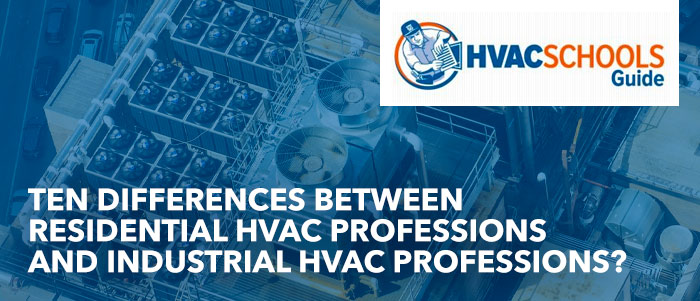
Here are ten differences between residential HVAC professions and industrial HVAC professions:
- Scale: Industrial HVAC systems are much larger than residential systems. According to acmeac.com, industrial HVAC systems can range from 10 to 100 tons, while residential systems are typically under 5 tons.
- Complexity: Industrial HVAC systems are more complex than residential systems, often including custom designs and multiple zones. According to wacoinc.net, industrial HVAC systems require specialized knowledge and skills due to their complexity.
- Regulations: Industrial HVAC systems are subject to more stringent regulations and building codes than residential systems. According to the Occupational Safety and Health Administration (OSHA), industrial HVAC professionals must follow safety regulations for handling hazardous materials and working in confined spaces.
- Specializations: Industrial HVAC professionals may specialize in specific areas such as refrigeration or process cooling. Industrial HVAC professionals must have a deep understanding of the systems they work with, which may require specialized training.
- Working environment: Industrial HVAC professionals often work in challenging environments such as factories, chemical plants, and hospitals. According to the Bureau of Labor Statistics (BLS), industrial HVAC professionals may work in cramped or uncomfortable spaces.
- Teamwork: Industrial HVAC systems are larger and more complex, requiring teams of professionals to install, maintain, and repair them. Industrial HVAC professionals must be able to work as part of a team and communicate effectively.
- Equipment: Industrial HVAC systems often use specialized equipment, such as chillers or boilers, that may not be found in residential systems. Industrial HVAC professionals must be able to troubleshoot and repair this equipment.
- Safety: Industrial HVAC systems may present more safety hazards than residential systems. According to the CDC.gov, industrial HVAC professionals must be aware of potential hazards such as electrical shock, falls, and exposure to hazardous materials.
- Maintenance: Industrial HVAC systems require more frequent and specialized maintenance than residential systems. According to the BLS, industrial HVAC professionals must be skilled at troubleshooting and diagnosing problems in these systems.
- Pay: Industrial HVAC professionals may earn higher salaries than residential HVAC professionals due to the specialized knowledge and skills required. According to the BLS, the median annual wage for industrial HVAC professionals was $53,410 in 2020, compared to $50,590 for residential HVAC professionals.
- The Future of HVAC: Smart Technology & Automation in 2025
- Best Online HVAC Schools in 2025
- How Hard Are HVAC Classes?
- What Are Ten Differences Between Residential HVAC Professions and Industrial HVAC Professions?
- What Are Some Specific Examples of What I May Learn in HVAC School?
- I’m Ready to Apply to HVAC School. What Are the Steps to Take?
- The Important of HVAC Training in Regards to Climate Change